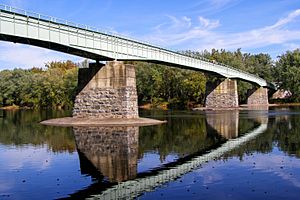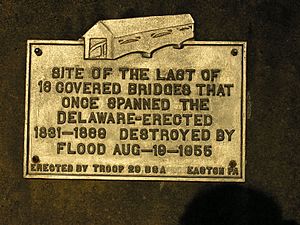Portland–Columbia Pedestrian Bridge facts for kids
Quick facts for kids Portland–Columbia Pedestrian Bridge |
|
|---|---|
 |
|
| Crosses | Delaware River |
| Locale | Portland, Pennsylvania, Columbia, New Jersey |
| Characteristics | |
| Design | Truss bridge |
The Portland–Columbia Pedestrian Bridge is a special bridge just for people to walk or bike across. It stretches over the Delaware River. This bridge connects the town of Portland in Pennsylvania to Columbia in New Jersey. The Delaware River Joint Toll Bridge Commission owns and takes care of this bridge.
Contents
A Look Back: The Bridge's History
The First Bridge
A very long time ago, even before this pedestrian bridge existed, there was a different bridge here. It was built in 1869 and cars could drive on it. This first bridge was made of timber (wood) and had four sections. It was even covered by a wooden shed with a slate roof, like a tunnel!
For many years, this bridge was a "toll bridge." This means people had to pay a small fee to cross it. It was a private bridge until 1927.
A New Bridge and a Big Storm
By December 1, 1953, the old wooden bridge was closed to cars. Car traffic moved to a new bridge, the Portland-Columbia Toll Bridge. This new bridge was built a little bit downstream from the old one.
In August 1955, a huge storm called Hurricane Diane hit the area. It was one of the wettest hurricanes ever to hit North America. This storm caused record flooding, especially along the Delaware River. Three of the four sections of the old wooden bridge were washed away by the floodwaters.
Building the Pedestrian Bridge
Starting in 1957, the bridge was rebuilt. This time, it was designed as a steel bridge with strong concrete supports. It was opened for people to use on October 22, 1958.
In 1996, new safety rails were added to the bridge. Also, a special ramp was built on the New Jersey side. This ramp makes it easier for everyone, including people using wheelchairs, to access the bridge. This was done to follow the Americans with Disabilities Act (ADA) rules.
 | Anna J. Cooper |
 | Mary McLeod Bethune |
 | Lillie Mae Bradford |


